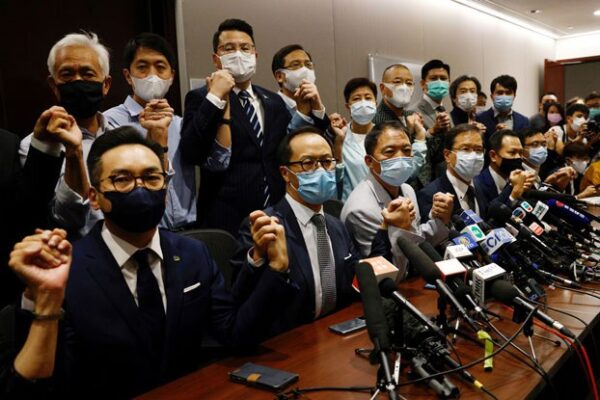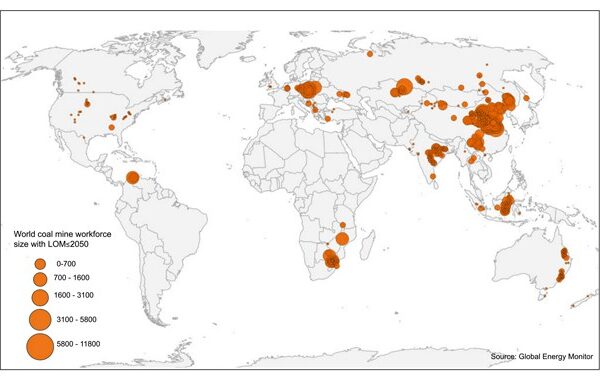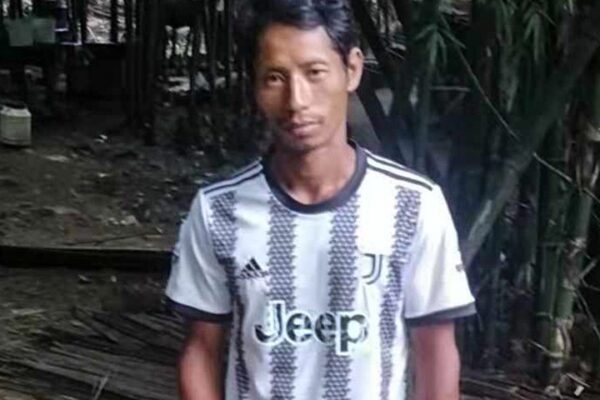
Police arrest former opposition councilor amid call to boycott poll
Hong Kong police have arrested a former pro-democracy member of the city’s District Council and prison welfare activist — amid calls for a boycott of forthcoming district elections, which are open to “patriots only.” Derek Chu, a 46-year-old former directly elected councilor who resigned in 2021 before being forced to take an oath of loyalty to the Hong Kong and Chinese governments, was arrested in Shatin on Tuesday on suspicion of breaching the city’s mandatory pension law, police told the paper. His arrest comes as the government moves ahead with an “election” process that will slash the number of directly elected seats on the District Council by 80%, while ensuring that almost nobody in the city’s once-vibrant opposition camp will stand for election again, the result of ongoing arrests of pro-democracy figures and rule changes requiring political vetting. “At about 12 noon, Derek Chu was taken to an office at Manulife Plaza in Kwun Tong by the police for evidence collection,” the report said. “He was later taken to a food store in W Plaza in Mong Kok and Fuk Keung Industrial Building in Tai Kok Tsui for investigation.” Those locations are linked to Chu’s “Migratory Bird” platform to support prisoners, which raised money via the As One online shopping platform – part of the “yellow economic circle of pro-democracy businesses” – to support his prison work. He is currently being held by the Sham Shui Po Crime Division pending further investigation, after his home was also searched and documents confiscated, the paper reported. Pan-democratic legislators announce their resignation from Hong Kong’s Legislative Council in Hong Kong, Nov. 11, 2020. Credit: Tyrone Siu/Reuters Chu was a member of the last directly elected District Council, which saw a landslide victory for pro-democracy candidates amid record turnout that was widely seen as a ringing public endorsement of the 2019 protest movement. He resigned his seat along with many like-minded colleagues amid an ongoing crackdown on dissent under a national security law imposed on the city by Beijing from July 2020. ‘Patriots’ only The government later changed the Legislative Council electoral rules to ensure only “patriots” loyal to Beijing could stand as candidates or hold any kind of public office, prompting record-low turnout of 30.2% in Legislative Council elections in December 2021 compared with more than 70% in the last District Council poll. Officials then rewrote the District Council poll rules in May, citing a “disastrous” result in the 2019 election, sparking calls from overseas activists for a boycott of the forthcoming poll on Dec. 10. “Abandon illusions, boycott this fake election,” read an Oct. 16 statement on Facebook signed by dozens of former pro-democracy councilors. “We, the last district councilors to be elected by the citizens of Hong Kong, solemnly declare that we will not recognize these so-called elections run by the Communist regime of Hong Kong, and call on all citizens of Hong Kong to boycott the election and the councilors it produces,” the statement said. It said candidates wishing to take part have to run a complex gamut of vetting from support for nomination to a slew of official recommendation letters to political background checks, “all of which runs counter to the democratic spirit,” warning that anyone who makes it to the list of candidates is “purely a permitted cheerleader for the regime.” It said the government also looks set to use the “election” as an opportunity to engage in “the political brainwashing of minors.” “This so-called election will actually take place under military totalitarian rule, and can have no fairness or legitimacy,” the councilors wrote. Australia-based former pro-democracy lawmaker Ted Hui, who signed the statement, said the forthcoming poll is a “huge step backwards for democracy” in Hong Kong. “Most of the seats will be controlled by the government,” Hui said. “We believe that it would be best for citizens to totally refuse to take part, to boycott [the election].” ‘Huge step backwards’ Some parties in the democratic camp have said they will field candidates, though it remains to be seen if their bid for candidacy will be accepted. The Democratic Party has said it hopes to field six candidates, and the Association of Democracy and People’s Livelihood wants to field two. Candidates celebrate after winning in the Legislative Council election in Hong Kong, December Dec. 20, 2021. The rules for the election were changed to ensure only ‘patriots’ loyal to Beijing could stand as candidates or hold any kind of public office. Credit: Lam Yik/Reuters But Hui said this could send a dangerous signal about complicity with the authorities, who have told opposition parties to give up any hope of “Western-style democracy” in the city. “One or two [pro-democracy candidates] might pass the test and get nominated, but this will do great harm, because it shows the people of Hong Kong that they agree with this huge step backwards for democracy,” he said. Former district councilor Sam Yip, who also signed the statement, said it was naive of pro-democracy parties to imagine it was worth contesting such elections. “It helps to whitewash these elections, which are illegal, unfair and inconsistent with the whole concept of democracy,” Yip said. “Their actions are actually ruining democracy.” ‘A screening process’ Secretary for Home and Youth Affairs Alice Mak, asked if the government is expecting turnout to fall in this year’s poll, said it wasn’t the most important thing. “We should not just look at the turnout in District Council elections, [which can be] affected by many factors, such as the weather, including whether it rains that day, whether there is a typhoon in the summer, and whether the weather will be too cold,” Mak said. “The most important thing is how to find patriots who sincerely serve the community and citizens through the electoral system,” she said. Former Hong Kong Island Eastern District councilor Derek Ngai, who also resigned to avoid taking his oath, said democrats faced with the oath of loyalty requirement feared being required to pay back two…







